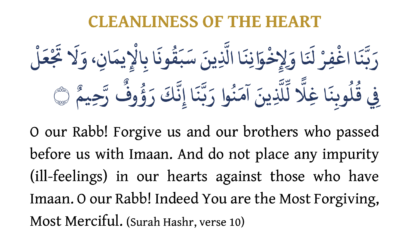Last verses of Surah al Imran, Surah imran last 10 ayat
Meaning of Last verse of Surah al Imran
- In this verse, Muslims have been instructed to remain patient which is possible any time under all conditions.
- The second instruction given is to be more patient than others which is to be demonstrated while fighting disbelievers.
- The third instruction relates to a situation when an armed conflict with disbelievers is likely and there is the danger that fighting may erupt anytime.
- Finally comes the instruction to observe Taqwa (fear of Allah) which is the essence of everything one does and on which depends the Divine acceptance of what has been done.
This set of instructions is the sum of almost all injunctions of the Shari’ah. May Almighty Allah give all of us the best of ability to act in accordance with these instructions.
Also see last verses of Surah Baqarah
Lessons from Last verses of Surah al Imran- understanding Ribat and Sabr
There are three things in the verse Muslims have been charged with. These are Sabr, Musabarah and Murabatah. The fourth element is Taqwa which is a necessary ingredient of all three. Their meanings are being given below.
Sabr- Patience
Literally, the Arabic word ‘Sabr’ means ‘to hold’ or ‘to tie’. In the terminology of the Qur’an and Sunnah, Sabr’ is the effort made to control and defend one’s slippery self against what is temperamentally unpleasing. This ‘Sabr’ (roughly translated as ‘patience’ for want of an exact equivalent) takes three forms:
- Patience with Duties: It means that everything commanded by Almighty Allah and His Messenger must be obediently pursued, no matter how burdensome the adherence to them may appear to be. The aim is to keep one’s self almost rivetted to carry out injunctions despite hinderances.
- Patience against Sins: It means holding the desiring self back from whatever has been prohibited by Allah and His Messenger, no matter how desirable and appealing it may be.
- Patience in Distress: It means enduring in hardship and forbearing in pain and avoiding excessive anxiety. Such patience requires that all pain and comfort be taken to have come from Allah and from this realization comes the strength to keep one’s self under control.
‘Musabarah’
The word, ‘Musabarah’ is a derivation from Sabr. It means staying firm and steadfast against the enemy.
The word, ‘Murabatah’ comes from ‘Rabt’ . Root-wise, it means ‘to tie’ and it is for this reason that ‘Rib at’
Murabatah’
and ‘Murabatah’ are taken to mean ‘to tie horses’ and ‘get ready for war’. In the terminology of the Qur’an and Hadith, this word has been used in two senses:
- To secure Islamic frontiers for which it is necessary to be armed with military hardware, conventional or modern, so that the enemy abstains from venturing against Islamic frontiers.
- To be so observant of and bound by making Salah with Jama’ah that one starts looking forward to making the next Salah soon after having performed one.
Both these are highly acclaimed acts of worship in Islam. Out of their numerous merits, some are being given below:
Ribat: The Guarding of Islamic Frontiers
Staying along the Islamic frontiers to guard the area in battle- ready condition is known as ‘Rib at’ and ‘Murabatah’. It takes two forms.
Firstly, there may be no danger of war breaking out, the border is secure and the duty is limited to being vigilant enough to ward off any impending threat. Under such condition, it is quite permissible for those on duty to start living there with their families and earn their living through farming or some such occupation.
Under this condition, if the real intention is to guard and defend Islamic borders and living and earning there remains subservient to this intention, this person will get the reward for staying in the way of Allah’ , even if he never fights. But, anyone whose real intention is not to guard and defend Islamic frontiers but would simply be there to eke out a living – even if he gets the chance of guarding the borders casually – this person will not be considered as ‘one who stays in the way of Allah’.
Read : 5 hadith on Martyr
There are countless merits in both these cases. In the Sahih of al- Bukhari, it has been reported from Sayyidna Sahl ibn Sa’d Sa’adi that the Holy Prophet Sallalahu alaihe wa sallam said:
Ribat for a day in the way of Allah is better than whatever there is in the whole world.
Prophet Muhammad PBUH
In the Sahih of Muslim, it has been reported from Sayyidna Salman that the Holy Prophet Sallalahu alaihe wa sallam said: Ribat for a day and night is better than fasting for a whole month and standing in prayers for the entire night. Should one die in that state, the daily reward for his act of staying in the way of Allah will continue to reach him for ever. His sustenance will keep coming from Almighty Allah and he will stay protected against the Satan.
Abu Dawud reports from Fudalah ibn ‘Ubayd that the Holy Prophet Sallalahu alaihe wa sallam said: The roster of deeds credited to the person who dies ends with his death except in the case of a Murabit (one who stays in the way of Allah) whose roster of good deeds goes on multiplying right through to the Day of Judgment and he remains covered against (the fear of punishment) on account of the scrutiny of deeds in his grave.
These narrations indicate that the act of staying in the way of Allah (Ribat) is superior even to every charity the benefit of which keeps going on and on {Sadaqah Jariyah). This is because the reward for charity the benefits of which continue lasts only upto the time people keep benefiting from the endowment of house, land, book or library. Once this benefit stops reaching people, the incumbent reward also stops. But, the reward of the person who stays in the way of Allah is not going to stop until the Day of Judgment.
The reason is that Muslims as a community can continue doing what is good only when they are well-protected against enemy attacks. Thus, the act of a person who stays on to defend Islamic frontiers becomes the cause of good deeds performed by all Muslim in a peaceful setting.
Therefore, the reward of such Ribat fi sabilillah (staying in the way of Allah) will continue until the Day of Judgment. In addition to that, the reward for whatever other good deeds he used to do during his life in the world will continue without his having to actually do them. This is as It appears in ibn Majah in an authentic narration from Sayyidna Abu Hurairah where he reports that the Holy Prophet Sallalahu alaihe wa sallam said:
One who dies in a state of Ribat in the way, of Allah, the reward of whatever good he used to do in his mortal life will continue and so will his sustenance and he will stay protected against Satan and Allah will raise him on the Day of Qiyamah free from fear. (TafsTr al-Qurtubi)The merits mentioned in this narration are subject to the condition that the person meets his death while staying on the border to guard Islamic frontiers. But, there are other reports which indicate that his post-death reward will still continue even if he were to return alive back to his family.
Sayyidna Ubayy ibn Ka’b narrates that the Holy Prophet Sallalahu alaihe wa sallam said: The reward for sincerely guarding the weak border area of Muslims for one day, other than those of Ramadan, is superior to the reward for continuous fasting and nightly worship for one hundred years.
Ribat for one day in Ramadan is superior to fasting and nightly worship for one thousand years (the narrator has expressed some doubt about the later). Then, he said: If Allah sends him back to his family in good health, no sin will be recorded in his name for a thousand years while good deeds will continue to be entered in his roster and the reward for his act of having stayed at the border to defend Islamic frontiers will keep coming to him until the Day of Judgment (Qurtubii)
Offering salah with Jam a’ ah and waiting for the next is also ‘staying in the way of Allah’
Sayyidna Abu Salaman ibn Abdur-Rahman narrates that the Holy Prophet Sallalahu alaihe wa sallam said: I tell you something because of which Almighty Allah would forgive your sins and raise your spiritual status. These are: Making Wudu precisely and perfectly despite chilly weather or pain or wound because of which the washing of body parts that must be washed while making wudu may appear to be hard to do; and going to the Masjid time and again more than often; and waiting to make the next Salah following the one already made. Then, he said: For you, this is the Ribat (staying to guard Islamic frontiers in the way of Allah*.
After having reported this hadith. Imam al-Qurtubi has said that in the light of this hadith it can be hoped that a person who adheres to the practice of waiting between two prayers with congregation will receive the reward which has been mentioned in ahadith for Ribat in the way of Allah.
Tafseer taken from Mariful Quran (amazon link )
Discover more from Islam Hashtag
Subscribe to get the latest posts sent to your email.









